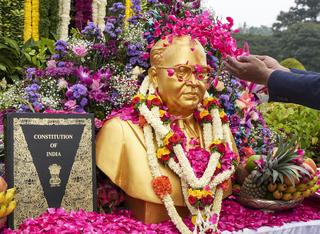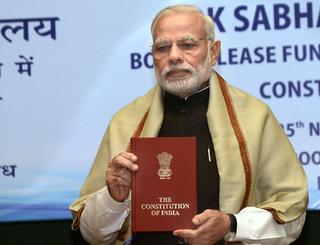Constitution: The Alternative Law Forum (ALF) has launched a unique multilingual video series that brings the Preamble of the Indian Constitution to the screens of people across Karnataka, voiced in more than 14 regional languages. This initiative aims to revive constitutional awareness while celebrating the diversity of cultures and dialects spoken in the state. By making the Preamble accessible to everyone in their mother tongue, ALF hopes to strengthen emotional connections with the values of justice, liberty, equality, and fraternity.
The project was launched in Bengaluru with the participation of activists, educators, language researchers, and students who collectively emphasized the importance of preserving regional identities while building constitutional consciousness. Organizers highlighted how the Preamble remains the moral and foundational compass of India, yet is often recited mechanically without deeper understanding. Through creative audio-visual interpretation, the video series intends to spark genuine appreciation, especially among younger audiences.
Celebrating Linguistic Identity Through Constitutional Values
The ALF team worked with speakers and cultural leaders from different linguistic groups in Karnataka to ensure authenticity in diction, tone, and cultural resonance. Each video features a narrator representing a specific community, dressed in traditional attire, reciting the Preamble in their distinctive language. This linguistic bouquet includes Tulu, Kodava, Urdu, Soliga, Byari, Halakki, Lambani, Dakhni, among others spoken widely by pockets of Karnataka’s population. Organizers emphasized that the initiative is not merely a translation project, but a representation of identities that often remain unacknowledged in mainstream narratives.
For many participants, the experience of speaking the Preamble in their own language was described as empowering. One contributor, a Halakki speaker, shared that their culture is usually associated only with folklore and dance, but the project allowed them to see their language as part of constitutional dialogue. This emotional reaction, according to ALF members, reinforces that constitutional values become meaningful when rooted in lived experiences. The campaign intends to challenge the notion that the Constitution belongs only to scholars, courts, or lawmakers, instead spotlighting its presence in everyday civic life.
The videos also address a broader concern about fading linguistic traditions. Researchers have long warned that several languages spoken by Karnataka’s tribal and coastal communities are facing erosion. By using constitutional text to preserve these languages, ALF hopes to encourage documentation and intergenerational transfer of linguistic knowledge. The organizers plan to distribute the videos to government schools, colleges, and community organizations.
BENGALURU: In a landmark effort to bring the Constitution closer to people’s everyday lives, the Alternative Law Forum (ALF) has launched a video series rendering the Preamble in Karnataka’s many languages, turning a legal text into a living, spoken promise shared across communities. The initiative blends law, culture, and digital media, giving the Preamble a new emotional register as it is heard in the accents, cadences, and vocabularies of people from different corners of the state. For many viewers, hearing the foundational values of justice, liberty, equality, and fraternity in a familiar tongue is less a lesson and more a moment of recognition: a sense that the Constitution is not a distant document, but something that belongs to them.
The series is part of a broader effort by ALF and allied groups to demystify the Constitution and move it out of the exclusive domain of courts, lawyers, and government institutions. Instead, the Preamble is treated as a shared cultural text, as central to public life as a popular song or a folk saying. In a state often defined by its linguistic diversity, this approach carries special weight: different communities may speak different languages, but they can now gather around one shared set of constitutional ideals, each expressed in words close to home.
Each video in the series features the Preamble read aloud or performed in a specific language of Karnataka, accompanied by simple visuals that reflect the community or region associated with that tongue. The mood is intentionally intimate rather than grandiose. Many of the recordings take place in ordinary spaces — homes, community halls, local landmarks, even open fields — to reinforce the idea that the Constitution lives where people live, not only in the halls of power. Subtle background sounds, like street noise or birds, are often left in, underscoring that constitutional values are meant for the real, everyday world.
The choice to foreground multiple languages also sends a political and cultural message. In a time when debates about language, identity, and belonging routinely flare up, ALF’s project quietly insists that a shared constitutional framework can hold many tongues together without demanding uniformity. The Constitution, in this telling, does not erase difference; it weaves difference into a larger fabric. Viewers watching the playlist can move from one language to another, hearing the same Preamble reshaped by different rhythms and word choices, yet always guided by the same core ideas.
The series has been rolled out on popular social platforms, where short-form video content is already part of daily life for young people. ALF hopes this familiarity of format will make it easier for the Preamble to travel beyond classrooms, courtrooms, and official ceremonies. Instead of appearing only once a year on Constitution Day or Republic Day, the Preamble can now pop up in a scrolling feed, shared between friends, family members, and classmates. The underlying bet is simple: if people encounter the Constitution more often and in more personal ways, they are more likely to care about what it says.

Expanding Constitutional Literacy Through Digital Platforms
ALF’s multilingual campaign aligns with a growing movement to disseminate the Preamble widely through cultural mediums. The organization plans to release one video at a time on educational platforms and social media channels, accompanied by contextual information about each language and community. The structure includes explanations of how constitutional values intersect with social justice movements, gender rights, and environmental struggles faced by Karnataka’s marginalized groups. The goal is to make the Constitution relatable rather than theoretical.
Legal experts at the launch stressed that constitutional awareness must keep pace with contemporary challenges, including growing digital misinformation, polarization, and attacks on dissent. Many pointed out that a citizen who understands their rights and duties through their own linguistic lens becomes more confident in asserting democratic freedoms. They argued that language serves as an entry point to inclusivity, and when people hear constitutional values in familiar tones, they develop a deeper sense of belonging to the nation’s legal framework.
Teachers who attended the event expressed that students often find civics textbooks monotonous, but multimedia storytelling can make constitutional studies engaging. ALF is therefore planning collaborative workshops with educators to help integrate the videos into classroom discussions. The initiative also seeks to encourage grassroots organizations to translate civic guidance, voter awareness messages, and complaint redressal information into regional languages, expanding the practical utility of multilingual education.
A Bridge Between Grassroots Culture and Modern Rights Movements
What makes ALF’s project striking is its attempt to bridge ancient linguistic heritage with modern democratic ideals. Karnataka’s linguistic diversity is not limited to widely recognized tongues but includes dialects shaped by centuries of migration, trade, agriculture, forest life, and coastal livelihoods. Many of these languages do not receive governmental support, which means speakers sometimes lack resources for education or cultural transmission. By linking them to the Constitution, the initiative proposes a form of dignity and acknowledgment that goes beyond symbolic celebration.

Activists at the launch emphasized that many communities who speak these languages also face discrimination, land disputes, or limited access to welfare. When they hear the promise of justice and equality in their own vernacular, it invites them to view the Constitution as a tool that represents them. The videos, therefore, serve not only as cultural artifacts but as empowerment instruments. The ALF video featuring the Soliga community, for instance, is expected to resonate with tribal groups fighting for forest rights in Karnataka and elsewhere across India.
The initiative also demonstrates how constitutional literacy can be decentralized. Rather than relying solely on government or academic institutions, community-driven projects can reinterpret legal documents creatively. ALF plans to organize public screenings in coastal villages and tribal settlements, followed by open discussions where people can express what the Preamble means within their local struggles. This format may encourage communities to seek legal support for issues they previously assumed were beyond their reach.
The Road Ahead: Inclusion, Documentation, and Policy Conversations
ALF’s multilingual Preamble effort has opened the door for future expansions, including versions in sign language and scripts developed for endangered tongues. Linguists involved in the project have recommended creating written documentation for languages lacking standardized scripts. They suggest pairing video recitation with archival efforts, ensuring that linguistic and cultural histories are preserved alongside constitutional awareness. Participants believe that if policymakers support such initiatives, the state could advance broader inclusion in education systems.
There were also calls to integrate multilingual civic education into elections, government schemes, and legal aid policies. Many speakers pointed out that citizens frequently struggle to access services simply because information is not available in familiar regional languages. Translating constitutional and legal texts in ways that resonate at the grassroots level has been suggested as a step toward reducing power imbalances between institutions and citizens. ALF representatives said they hope the project sparks dialogue about linguistic rights as an integral part of democratic rights.
As the video series is gradually released to the public, legal scholars, cultural historians, teachers, artists, and activists are anticipated to join hands for workshops, research discussions, and creative events inspired by the initiative. Whether in classrooms, community halls, folk art performances, or digital platforms, the Preamble is expected to find new life in the voices of Karnataka’s diverse speakers. The videos may eventually serve as educational tools, cultural documentation, and political inspiration.
Conclusion: A Constitutional Message Woven with Emotion
The ALF multilingual Preamble series shows how constitutional principles gain depth when expressed in the emotional language of communities often pushed to the margins. Instead of treating the Preamble as a distant legal statement, the project draws it close to everyday lives. Its impact lies not only in translation but in recognition, identity, and empowerment. When a citizen hears “equality” or “fraternity” in the voice of their culture, it transforms abstract ideals into lived promises.
At a time when public discourse is marked by polarization, this initiative stands as a quiet yet powerful reminder that India’s strength lies in unity without uniformity. The Constitution was written for everyone, but it becomes truly meaningful only when every citizen feels ownership over its words. Through this effort, ALF is not just reciting the Preamble; it is reviving its spirit — one language, one community, and one emotional connection at a time.
Follow: Karnataka Government
Also read: Home | Channel 6 Network – Latest News, Breaking Updates: Politics, Business, Tech & More

